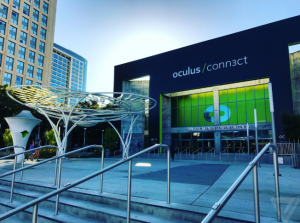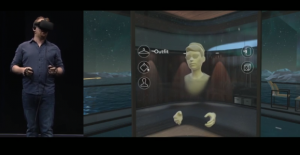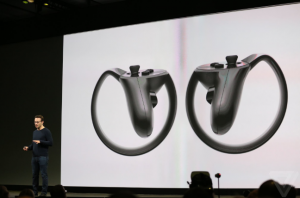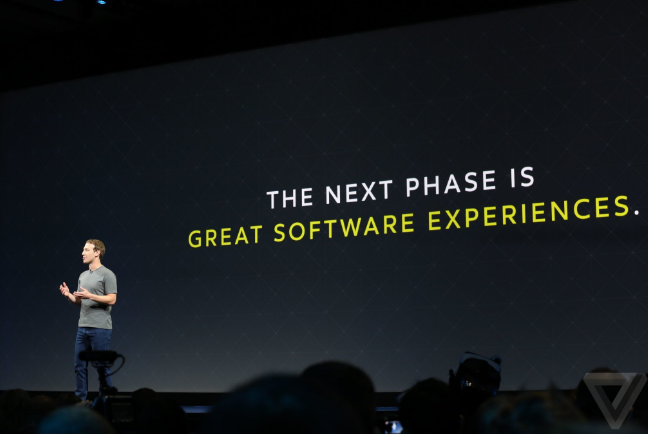aNewDomainVR — At the Oculus Connect developers’ conference here in San Jose today, Facebook chief Mark Zuckerberg and execs at Facebook’s Oculus announced a range of new developer tools and platforms for the Oculus Rift, Oculus-powered Samsung Gear VR and the upcoming Oculus Touch controller.
— At the Oculus Connect developers’ conference here in San Jose today, Facebook chief Mark Zuckerberg and execs at Facebook’s Oculus announced a range of new developer tools and platforms for the Oculus Rift, Oculus-powered Samsung Gear VR and the upcoming Oculus Touch controller.
The $199 Oculus Touch controller, execs said, will ship December 6.
The event wasn’t about the new hardware, though. The some dozen Oculus announcements unleashed this morning were for developers, and they followed along a single theme, which Zuckerberg spelled out as soon as he hopped on stage.
“Look around the room,” he told the packed room of developers and journalists gathered there. “What we’re wired to see isn’t the chairs or the walls, it’s the people. That’s how our brains work, and that’s why I’ve spent my life trying to build technology that puts people at the center of the experience.”
“Imagine,” Zuckerberg continued, “if you had to switch spaces like you switch apps, you’d be in a room eating by yourself, then if you wanted to talk to friends you’d get up and go to a different place, and if you wanted to get a photo you’d have to go to yet another room. That’s not going to be how virtual reality works.”

Oculus’ direction now is about changing the perspective — “from apps-first to people first.”
Zuckerberg added, “People first doesn’t mean that every experience is going to be social, because it’s not, and most aren’t. But it does mean that we should build software and experiences that follow the way our minds work and the way we process the world.”
Among the dozen or so announcements Oculus made at the event were: ReactVR, a platform for developing mobile and web-based experiences based around Facebook’s React javascript framework and the nascent WebVR standard; APIs for Parties and Rooms; new multiuser capabilities for Oculus and the Oculus-powered Samsung Gear VR; Oculus Avatars, for the creation of persistent avatar identities that can travel among apps and social VR experiences; a collaboration with The Walt Disney Company; Oculus Earphones, a set of $49 earphones that will ship later this year; and a new virtual reality equipped web browser, code-named Carmel.
The developer kit for Carmel is shipping soon, said Oculus co-founder and product chief Nate Mitchell.
The whole set of announcements today were aimed at creating platforms and capabilities around the sort of futuristic VR experiences Zuckerberg has been posting about for the last year on Facebook: experiences that would let viewers watch a game courtside, meet with a doctor virtually, or actually see and interact with other students in an online classroom.
The big emphasis was on the tools required to create such VR experiences in a way that would be shareable, easy to create and offer the ability to grant a social presence to audiences, experiences they can share and invite others to share with them.
 The ReactVR announcement was all about “creating simple, powerful experiences based on web technology, viewable on the web,” Mitchell added. “We are talking about just a few lines of javascript that you build in a few days, so can share your (creations) with anyone in the world — because it’s viewable in a browser,” he added.
The ReactVR announcement was all about “creating simple, powerful experiences based on web technology, viewable on the web,” Mitchell added. “We are talking about just a few lines of javascript that you build in a few days, so can share your (creations) with anyone in the world — because it’s viewable in a browser,” he added.
“This will lead to exponential growth in VR content,” Mitchell predicted, showing two demos he said he hoped would show what web-based VR experiences could look like. One was a travel app “that lets you check out hotels using 360-degree photospheres” together with additional informational data. The other was an automotive app, developed by Renault.
“We want to go beyond games,” he said, adding that Oculus is looking beyond social, too, with a renewed focus on the development of VR-equipped education apps.
“We’re going to do two things: Create a dedicated area in the Oculus Store for (educational titles) — and we are also announcing a $10-million fund for educational software developers.”
But games are still key, clearly. At the event, Oculus execs previewed a number of mobile VR titles as well as some high-profile games and titles. Our favorite: A VR experience based on the just-announced Blade Runner sequel.
Oculus Touch: Shipping in 1Q 2017 with 35 titles
Also at the announcement, execs hyped up the upcoming $199 Oculus Touch, due Dec. 6.
That long-awaited controller will have about 35 titles available for it at launch, they said.
Among the 35 titles available at launch will be 4A’s Arktika 1, Ready at Dawn’s Lone Echo and Robo Recall from Epic, maker of the Unreal engine
Mission ISS, based on VR training tech used by ISS astronauts, is notable among the 35 titles, as are the upcoming Touch titles, Kingspray Graffiti Simulator and Quill. The latter is the illustration software Oculus is using to make its next VR film Dear Angelica. Both of these will be available early next year around Sundance, Mitchell said.
Epic’s Nick Donaldson was also on hand for the announcement, by the way, no doubt because Oculus announced today that it will be covering Unreal development fees for Oculus developers.
Continuing …
For aNewDomainVR, I’m Gina Smith.
Here’s the trailer from Force Field VR’s Landfall.













